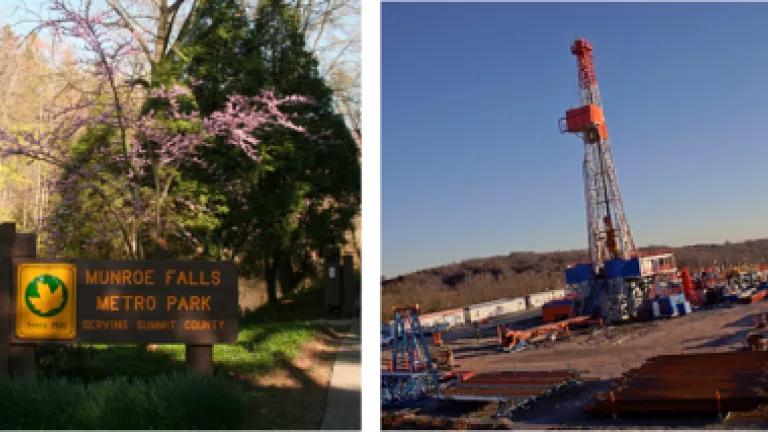Ohio Communities Stand Up to Protect Themselves from the Hazards of Hydraulic Fracturing

Imagine you live in a small city or town, one that prides itself on its welcoming neighborhoods and community values, and that draws residents as a great place to raise a family. Over the years, your hometown or city has defined areas for agricultural activities, shops and stores, residences and industry, possibly in keeping with a community development plan. It’s also adopted a careful set of reasonable standards for how each of these community aspects should establish themselves and evolve.
Then imagine that an oil and gas developer comes to your community and tells you that it’s got a permit from the state to frack a well, and that permit allows it to ignore all of the zoning protections that your community has adopted. How would you feel?
Last Friday, a group of Ohio municipalities weighed in on behalf of zoning protections to address the harmful impacts of fracking in an Ohio Supreme Court case pitting communities against unfettered oil and gas development. Aided by NRDC and local Ohio attorneys, and organized with the help of the People’s Oil and Gas Collaborative, the Cities of Broadview Heights, Euclid, Mansfield and North Royalton, and the Village of Mansfield, filed a friend-of-the-court (or “amicus”) brief in support of the City of Munroe Falls and its efforts to prevent the Beck Energy Corporation from disregarding the city zoning code. The City of Heath later joined as well.
The controversy at the heart of the case, State ex rel. Morrison v. Beck Energy Corp, began in early 2011, when Beck Energy commenced gas development operations in Munroe Falls after receiving a state drilling permit, but before obtaining local zoning approvals or complying with other city ordinances. The City issued a stop work order and took the drilling company to court in April of that year to enforce its ordinances, and now, after a split in the lower courts (the trial court siding with the City and the appellate court siding with the drilling company), the Ohio Supreme Court has agreed to hear the case.
This case follows on similar lawsuits in Pennsylvania and New York over local communities’ ability to protect themselves and their character against the harms of fracking. As in those cases, the Munroe Falls case asks whether the state oil and gas law overrides or “preempts” local authority to zone oil and gas activities. In their defense, Beck Energy has argued that provisions of the law give the Ohio Department of Natural Resources “exclusive authority” over the regulation of oil and gas activities, essentially awarding drillers carte blanche to ignore local zoning once a state permit has been issued. This would mean that local residents and leaders would have virtually no say as to where or how fracking occurs, even where it’s planned for a residential zone or next door to a school or hospital.*
As Munroe Falls has contended, and as other Ohio municipalities now join in arguing, such a blanket override of local communities would be devastating. Fracking is a heavy industrial activity—a process that produces toxic air pollution, excess truck traffic, landscape destruction and around-the-clock noise and bright light during phases of the operation. To strip local residents of any voice as to whether and how heavy industrial activities occur in the neighborhoods where they live and work is simply unthinkable, and contrary to Ohio’s tradition of home rule.
Local community character is deeply connected to the health and quality of life and of all Ohio residents; it is also vital to the economic well-being of many municipalities. And since it was first approved by the U.S. Supreme Court nearly 90 years ago in the Ohio case Village of Euclid v. Ambler Realty,** zoning has been a central and essential tool to protecting that character from the harms of industrial uses, such as fracking. The amicus brief filed by Ohio municipalities last week supports Ohio municipalities’ traditional and constitutional rights to zone industrial activities so they can ensure they are not the next victim of fracking impacts to hit Ohio’s newspapers.
Co-authored by Dan Raichel
Photos by John Potter and Mark Ovaska
*Under Ohio state law, a fracking well can be permitted as close as 150 feet from an “occupied dwelling” in cities with more than 5,000 residents, and as close as 100 feet of a dwelling in smaller villages and townships.
**This same Euclid, now a city, joined the amicus brief.
